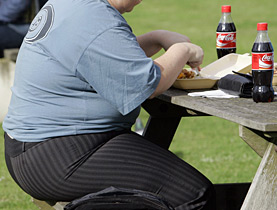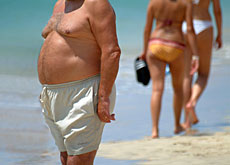Research offers hope amid obesity epidemic

The number of overweight Swiss children has decreased significantly over the past five years, according to a national study.
Researchers from the Federal Institute of Technology in Zurich found that 16.7 per cent of boys and 13.1 per cent of girls aged 6-13 were overweight in 2007, compared with almost 20 per cent in 2002.
The survey was presented on Thursday at the 2008 European Congress on Obesity that runs in Geneva until Saturday.
“I was very surprised by the findings as we feared an increase,” researcher Isabelle Aeberli told swissinfo. “I hope the tide is turning; it looks like it is, but we have to see if it’s sustainable.”
The team says the improvement is down to a combination of factors: increased public and professional awareness since 2002, more school-based programmes aimed at balancing physical activity and healthy nutrition, and less TV food advertising targeting children.
“The Federal Health Office, which commissioned the survey, were also surprised, but stress that one in six Swiss children is overweight and the fight against obesity is far from over,” said Aeberli.
On Thursday French researchers also presented the results of two new surveys that revealed that childhood obesity in France is levelling off, thought to be caused by a package of anti-obesity public health initiatives introduced in 2001.
Alain Golay, professor at Geneva’s University Hospital and congress co-chair, welcomed the good news.
“We have to give positive messages and offer hope to patients to tackle this chronic disease,” he told journalists.
The global scale of the obesity epidemic remains huge, however. In Europe there are wide variations in the number of obese and overweight adults and children, and in general waistlines are continuing to expand.
With the exception of Estonia, Latvia, Romania and Switzerland, half of all adults and one in five children in Europe are overweight, according to the World Health Organization (WHO). A third of these people are considered obese.
According to a 2005 study, 37 per cent of the Swiss population are overweight, up from 30 per cent in 1990.
Multi-pronged approach
Fighting the flab is a complex long-term battle that needs to be tackled on several fronts, say the experts.
It will require governments to take similar action to that used to curb smoking, Professor Boyd Swinburn, a public health researcher who works with the WHO, told Reuters.
This could include regulations that restrict how companies market “junk” food to children and requirements for schools to serve healthy meals, said Swinburn.
“The brakes on the obesity epidemic need to be policy-led and governments need to take centre stage,” he added.
And they must act to provide better treatment and services for the obese to cope with the rise of type 2 diabetes, arthritis, cardiovascular diseases and cancers caused by the obesity epidemic, added Vojtech Hainer, president of the European Association for the Study of Obesity.
“At the individual level you have to do physical exercise and eat less, but exercise alone is not enough, and you have to reduce people’s stress levels,” said congress chair Golay.
Geneva innovation
On Wednesday a successful innovative obesity treatment programme in Geneva was presented at the congress, which offers new hope for long-term weight loss.
Swiss researchers found that more than half of a group of morbidly obese patients – with a body mass index over 40 – maintained a 10kg weight reduction. Some 70 per cent of patients succeeded in avoiding further weight gain five years on.
“This is a phenomenal success rate. Finding a way to help patients maintain their weight loss over a long period of time is difficult and these findings show that it is indeed possible for many people,” said Séverine Buclin of Geneva University Hospital.
The unique low-cost programme goes beyond standard obesity treatment approaches to include a comprehensive array of skills-building workshops.
Patients were hospitalized for two weeks and enrolled in an intense programme based on losing 500 calories a day, an exercise regime of three walks per week and ten sessions of cognitive-behavioural psychotherapy.
The treatment also included workshops on eating for pleasure, detecting hidden fat, how to shop for food, exercise motivation, identifying triggers for bingeing, reconnecting with hunger, feeling the body through dance therapy and expressing emotion through art therapy.
Over a five-year period following the hospital stay, a family practice doctor trained in obesity treatment monitored each patient once every two months.
“This interdisciplinary approach allows the patient to tackle the problem from different angles – not just the diet – so they slowly change their lifestyle over the long term,” said Buclin.
swissinfo, Simon Bradley in Geneva
The World Health Organisation classifies around 400 million people around the world as obese, 20 million of them children under the age of five.
In the European Union, up to 27% of men and 38% of women are now considered obese.
Experts say obesity is most frequent among people with lower incomes and less education, who tend to eat more meat, fat and sugar.
Being overweight or obese increases a person’s chances of contracting a condition such as diabetes, heart disease, hypertension, cancer and osteoporosis.
Obesity costs anything between two and eight per cent of a nation’s health budget, according to the WHO.
Switzerland’s fifth national report on nutrition published in 2005 says that 37% of the Swiss population are overweight.
Nearly one in five youngsters, aged 15 to 25, eats fast food at least twice a week.
Diseases and health problems related to weight cost SF2.7 billion every year in Switzerland.
The number of obese children has increased five-fold since 1980.
The 2-day 2008 European Congress on Obesity runs in Geneva until May 17 and is being attended by some 2,500 experts.

In compliance with the JTI standards
More: SWI swissinfo.ch certified by the Journalism Trust Initiative












You can find an overview of ongoing debates with our journalists here . Please join us!
If you want to start a conversation about a topic raised in this article or want to report factual errors, email us at english@swissinfo.ch.